The Cambridge History of China. Vol. 12: Republican China, 1912-1949, Part 1
Подождите немного. Документ загружается.

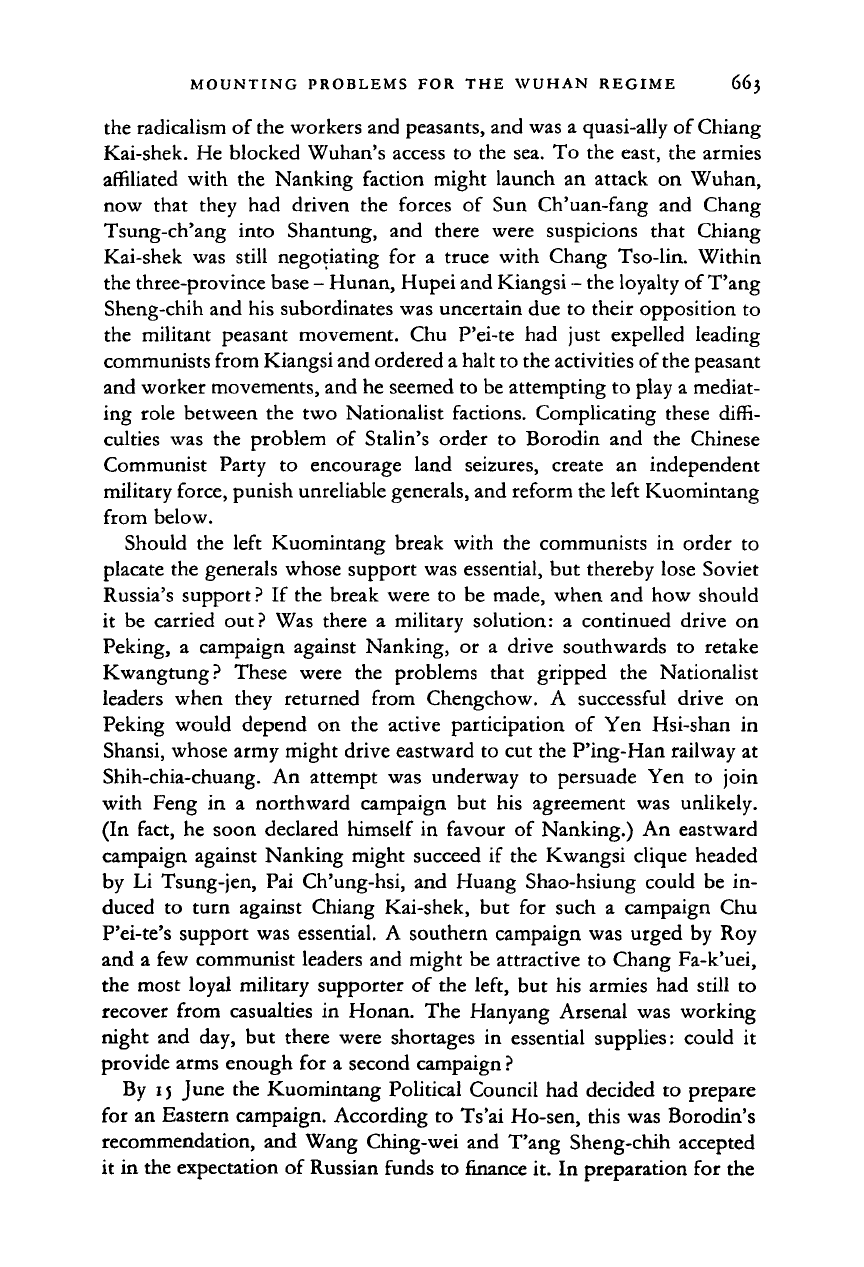
MOUNTING PROBLEMS FOR THE WUHAN REGIME 663
the radicalism of the workers and peasants, and was a quasi-ally of Chiang
Kai-shek. He blocked Wuhan's access to the sea. To the east, the armies
affiliated with the Nanking faction might launch an attack on Wuhan,
now that they had driven the forces of Sun Ch'uan-fang and Chang
Tsung-ch'ang into Shantung, and there were suspicions that Chiang
Kai-shek was still negotiating for a truce with Chang Tso-lin. Within
the three-province base - Hunan, Hupei and Kiangsi - the loyalty of T'ang
Sheng-chih and his subordinates was uncertain due to their opposition to
the militant peasant movement. Chu P'ei-te had just expelled leading
communists from Kiangsi and ordered a halt to the activities of the peasant
and worker movements, and he seemed to be attempting to play a mediat-
ing role between the two Nationalist factions. Complicating these diffi-
culties was the problem of Stalin's order to Borodin and the Chinese
Communist Party to encourage land seizures, create an independent
military force, punish unreliable generals, and reform the left Kuomintang
from below.
Should the left Kuomintang break with the communists in order to
placate the generals whose support was essential, but thereby lose Soviet
Russia's support
?
If the break were to be made, when and how should
it be carried out? Was there a military solution: a continued drive on
Peking, a campaign against Nanking, or a drive southwards to retake
Kwangtung? These were the problems that gripped the Nationalist
leaders when they returned from Chengchow. A successful drive on
Peking would depend on the active participation of Yen Hsi-shan in
Shansi, whose army might drive eastward to cut the P'ing-Han railway at
Shih-chia-chuang. An attempt was underway to persuade Yen to join
with Feng in a northward campaign but his agreement was unlikely.
(In fact, he soon declared himself in favour of Nanking.) An eastward
campaign against Nanking might succeed if the Kwangsi clique headed
by Li Tsung-jen, Pai Ch'ung-hsi, and Huang Shao-hsiung could be in-
duced to turn against Chiang Kai-shek, but for such a campaign Chu
P'ei-te's support was essential. A southern campaign was urged by Roy
and a few communist leaders and might be attractive to Chang Fa-k'uei,
the most loyal military supporter of the left, but his armies had still to
recover from casualties in Honan. The Hanyang Arsenal was working
night and day, but there were shortages in essential supplies: could it
provide arms enough for a second campaign
?
By 15 June the Kuomintang Political Council had decided to prepare
for an Eastern campaign. According to Ts'ai Ho-sen, this was Borodin's
recommendation, and Wang Ching-wei and T'ang Sheng-chih accepted
it in the expectation of Russian funds to finance it. In preparation for the
Cambridge Histories Online © Cambridge University Press, 2008
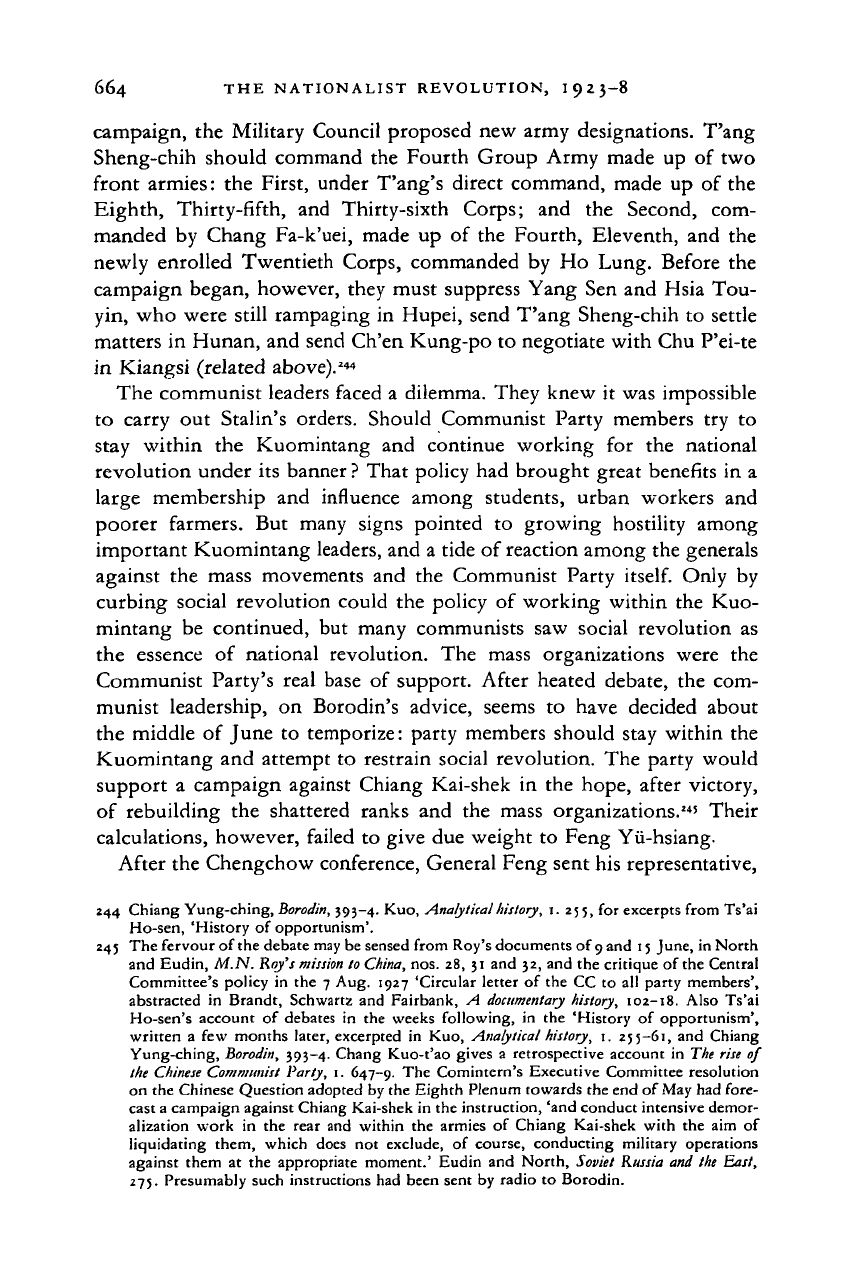
664 THE NATIONALIST REVOLUTION, 1923-8
campaign,
the
Military Council proposed
new
army designations. T'ang
Sheng-chih should command
the
Fourth Group Army made
up
of
two
front armies:
the
First, under T'ang's direct command, made
up
of
the
Eighth, Thirty-fifth,
and
Thirty-sixth Corps;
and the
Second,
com-
manded
by
Chang Fa-k'uei, made
up
of
the
Fourth, Eleventh,
and the
newly enrolled Twentieth Corps, commanded
by Ho
Lung. Before
the
campaign began, however, they must suppress Yang
Sen and
Hsia
Tou-
yin,
who
were still rampaging
in
Hupei, send T'ang Sheng-chih
to
settle
matters
in
Hunan,
and
send Ch'en Kung-po
to
negotiate with
Chu
P'ei-te
in Kiangsi (related above).
244
The communist leaders faced
a
dilemma. They knew
it
was
impossible
to carry
out
Stalin's orders. Should Communist Party members
try to
stay within
the
Kuomintang
and
continue working
for the
national
revolution under
its
banner
?
That policy
had
brought great benefits
in a
large membership
and
influence among students, urban workers
and
poorer farmers.
But
many signs pointed
to
growing hostility among
important Kuomintang leaders,
and a
tide
of
reaction among
the
generals
against
the
mass movements
and the
Communist Party
itself.
Only
by
curbing social revolution could
the
policy
of
working within
the Kuo-
mintang
be
continued,
but
many communists
saw
social revolution
as
the essence
of
national revolution.
The
mass organizations were
the
Communist Party's real base
of
support. After heated debate,
the com-
munist leadership,
on
Borodin's advice, seems
to
have decided about
the middle
of
June
to
temporize: party members should stay within
the
Kuomintang
and
attempt
to
restrain social revolution.
The
party would
support
a
campaign against Chiang Kai-shek
in
the
hope, after victory,
of rebuilding
the
shattered ranks
and
the
mass organizations.
24
' Their
calculations, however, failed
to
give
due
weight
to
Feng Yii-hsiang.
After
the
Chengchow conference, General Feng sent
his
representative,
244 Chiang Yung-ching,
Borodin,
393-4. Kuo, Analytical
history,
j. 255, for excerpts from Ts'ai
Ho-sen, 'History
of
opportunism'.
245 The fervour of the debate may be sensed from Roy's documents of
9
and 15 June, in North
and Eudin,
M.N.
Roy's
mission
to
China,
nos. 28, 31 and 32, and the critique of the Central
Committee's policy
in the
7 Aug. 1927 'Circular letter
of
the CC
to
all party members',
abstracted
in
Brandt, Schwartz and Fairbank,
A
documentary
history,
102-18. Also Ts'ai
Ho-sen's account
of
debates
in the
weeks following,
in the
'History
of
opportunism',
written
a few
months later, excerpted
in
Kuo, Analytical
history,
1.
255-61,
and Chiang
Yung-ching,
Borodin,
393-4. Chang Kuo-t'ao gives
a
retrospective account
in
The
rise
of
the
Chinese Communist
Party,
1.
647-9. The Comintern's Executive Committee resolution
on the Chinese Question adopted by the Eighth Plenum towards the end of May had fore-
cast a campaign against Chiang Kai-shek in the instruction, 'and conduct intensive demor-
alization work
in the
rear and within
the
armies
of
Chiang Kai-shek with
the
aim
of
liquidating them, which does
not
exclude,
of
course, conducting military operations
against them
at the
appropriate moment.' Eudin
and
North, Soviet Russia and the East,
z-l).
Presumably such instructions had been sent by radio
to
Borodin.
Cambridge Histories Online © Cambridge University Press, 2008
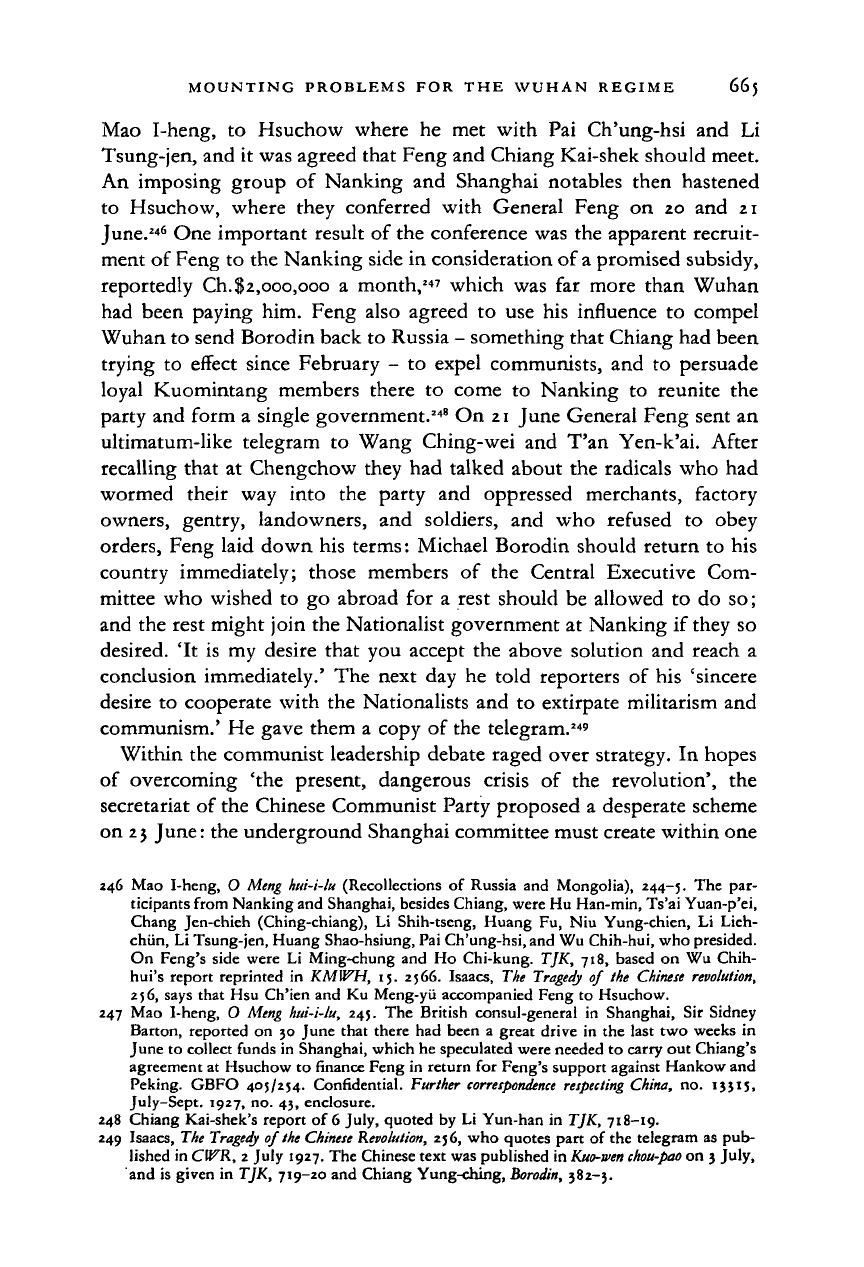
MOUNTING PROBLEMS FOR THE WUHAN REGIME 66j
Mao I-heng,
to
Hsuchow where
he met
with
Pai
Ch'ung-hsi
and Li
Tsung-jen,
and
it
was agreed that Feng
and
Chiang Kai-shek should meet.
An imposing group
of
Nanking
and
Shanghai notables then hastened
to Hsuchow, where they conferred with General Feng
on 20 and 21
June.
246
One
important result
of
the
conference
was the
apparent recruit-
ment
of
Feng
to the
Nanking side
in
consideration
of
a
promised subsidy,
reportedly Ch.$2,000,000
a
month,
247
which
was
far
more than Wuhan
had been paying
him.
Feng also agreed
to
use his
influence
to
compel
Wuhan
to
send Borodin back
to
Russia
-
something that Chiang
had
been
trying
to
effect since February
- to
expel communists,
and
to
persuade
loyal Kuomintang members there
to
come
to
Nanking
to
reunite
the
party
and
form
a
single government.
248
On
21 June General Feng sent
an
ultimatum-like telegram
to
Wang Ching-wei
and
T'an
Yen-k'ai. After
recalling that
at
Chengchow they
had
talked about
the
radicals
who had
wormed their
way
into
the
party
and
oppressed merchants, factory
owners, gentry, landowners,
and
soldiers,
and who
refused
to
obey
orders, Feng laid down
his
terms: Michael Borodin should return
to his
country immediately; those members
of the
Central Executive
Com-
mittee
who
wished
to go
abroad
for a
rest should
be
allowed
to
do so;
and
the
rest might join
the
Nationalist government
at
Nanking
if
they
so
desired.
'It is
my
desire that
you
accept
the
above solution
and
reach
a
conclusion immediately.'
The
next
day
he
told reporters
of
his
'sincere
desire
to
cooperate with
the
Nationalists
and
to
extirpate militarism
and
communism.'
He
gave them
a
copy
of
the
telegram.
249
Within
the
communist leadership debate raged over strategy.
In
hopes
of overcoming
'the
present, dangerous crisis
of the
revolution',
the
secretariat
of the
Chinese Communist Party proposed
a
desperate scheme
on 23 June:
the
underground Shanghai committee must create within
one
246
Mao
I-heng,
O
Meng hui-i-lu (Recollections
of
Russia
and
Mongolia), 244-5.
The par-
ticipants from Nanking and Shanghai, besides Chiang, were Hu Han-min, Ts'ai Yuan-p'ei,
Chang Jen-chieh (Ching-chiang),
Li
Shih-tseng, Huang
Fu, Niu
Yung-chien,
Li
Lieh-
chiin, Li Tsung-jen, Huang Shao-hsiung, Pai Ch'ung-hsi, and Wu Chih-hui, who presided.
On Feng's side were
Li
Ming-chung
and Ho
Chi-kung.
TJK,
718, based
on Wu
Chih-
hui's report reprinted
in
KMU^H, 15.
2566. Isaacs,
The
Tragedy
of
the
Chinese revolution,
256,
says that
Hsu
Ch'ien and
Ku
Meng-yii accompanied Feng
to
Hsuchow.
247
Mao
I-heng,
O
Meng hui-i-lu,
245. The
British consul-general
in
Shanghai,
Sir
Sidney
Barton, reported
on 30
June that there
had
been
a
great drive
in the
last
two
weeks
in
June
to
collect funds
in
Shanghai, which he speculated were needed
to
carry out Chiang's
agreement
at
Hsuchow
to
finance Feng
in
return
for
Feng's support against Hankow and
Peking. GBFO 405/254. Confidential. Further
correspondence respecting
China,
no.
13515,
July-Sept. 1927, no. 43, enclosure.
248 Chiang Kai-shek's report
of
6 July, quoted
by Li
Yun-han
in
TJK, 718-19.
249 Isaacs, The
Tragedy
of
the Chinese
Revolution,
256, who quotes part
of
the telegram
as
pub-
lished
in
CWK, 2 July 1927. The Chinese text was published in
Kuo-wen chou-pao
on 3 July,
and
is
given
in
TJK, 719-20
and
Chiang Yung-ching,
Borodin,
382-3.
Cambridge Histories Online © Cambridge University Press, 2008
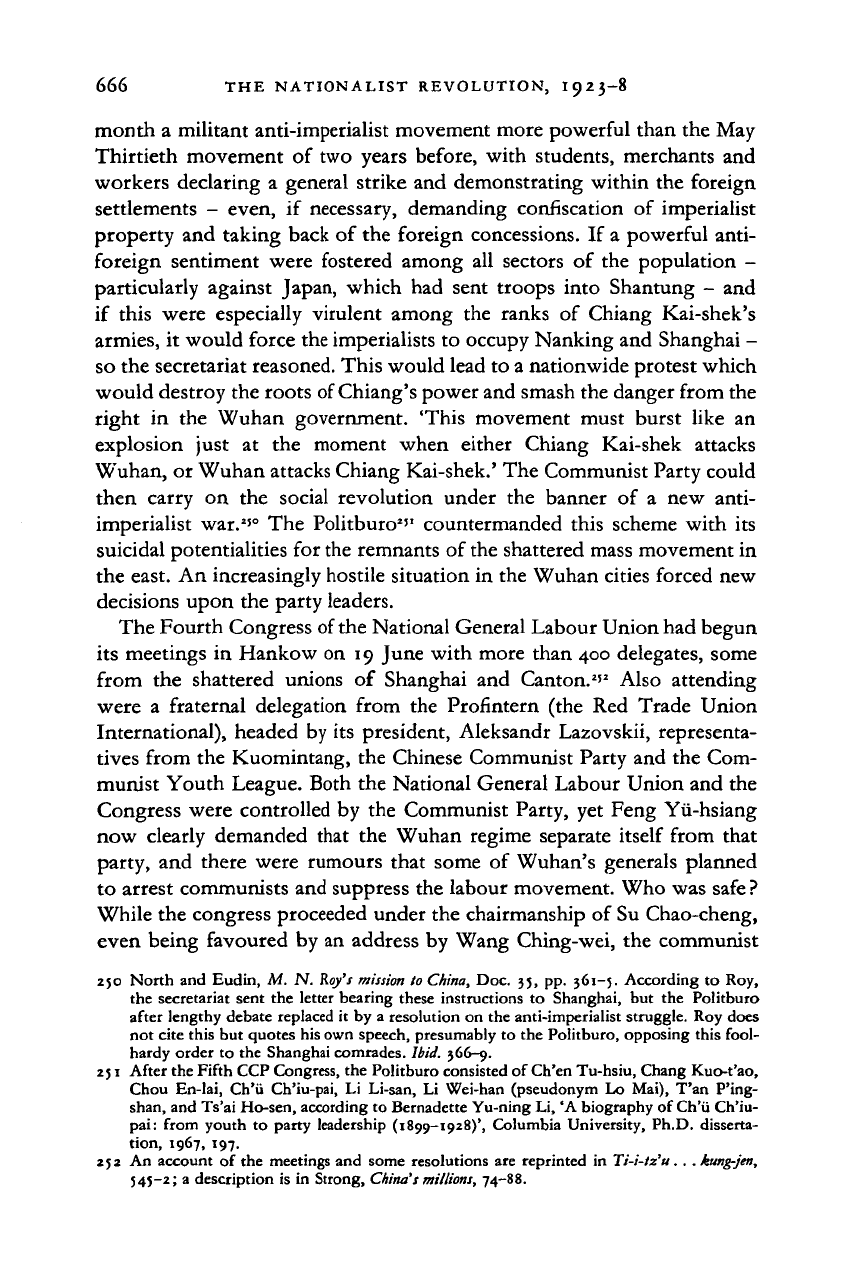
666 THE NATIONALIST REVOLUTION, I 923-8
month a militant anti-imperialist movement more powerful than the May
Thirtieth movement of two years before, with students, merchants and
workers declaring a general strike and demonstrating within the foreign
settlements - even, if necessary, demanding confiscation of imperialist
property and taking back of the foreign concessions. If a powerful anti-
foreign sentiment were fostered among all sectors of the population -
particularly against Japan, which had sent troops into Shantung - and
if this were especially virulent among the ranks of Chiang Kai-shek's
armies, it would force the imperialists to occupy Nanking and Shanghai -
so the secretariat reasoned. This would lead to a nationwide protest which
would destroy the roots of Chiang's power and smash the danger from the
right in the Wuhan government. 'This movement must burst like an
explosion just at the moment when either Chiang Kai-shek attacks
Wuhan, or Wuhan attacks Chiang Kai-shek.' The Communist Party could
then carry on the social revolution under the banner of a new anti-
imperialist war.
2S
° The Politburo
2
'
1
countermanded this scheme with its
suicidal potentialities for the remnants of the shattered mass movement in
the east. An increasingly hostile situation in the Wuhan cities forced new
decisions upon the party leaders.
The Fourth Congress of the National General Labour Union had begun
its meetings in Hankow on 19 June with more than 400 delegates, some
from the shattered unions of Shanghai and Canton.
2
'
2
Also attending
were a fraternal delegation from the Profintern (the Red Trade Union
International), headed by its president, Aleksandr Lazovskii, representa-
tives from the Kuomintang, the Chinese Communist Party and the Com-
munist Youth League. Both the National General Labour Union and the
Congress were controlled by the Communist Party, yet Feng Yii-hsiang
now clearly demanded that the Wuhan regime separate itself from that
party, and there were rumours that some of Wuhan's generals planned
to arrest communists and suppress the labour movement. Who was safe
?
While the congress proceeded under the chairmanship of Su Chao-cheng,
even being favoured by an address by Wang Ching-wei, the communist
250 North and Eudin, M. N.
Roy's mission
to China, Doc. 35, pp. 561-5. According to Roy,
the secretariat sent the letter bearing these instructions to Shanghai, but the Politburo
after lengthy debate replaced it by a resolution on the anti-imperialist struggle. Roy does
not cite this but quotes his own speech, presumably to the Politburo, opposing this fool-
hardy order to the Shanghai comrades.
Ibid.
566-9.
251 After the Fifth CCP Congress, the Politburo consisted of Ch'en Tu-hsiu, Chang Kuo-t'ao,
Chou En-lai, Ch'ii Ch'iu-pai, Li Li-san, Li Wei-han (pseudonym Lo Mai), T'an P'ing-
shan, and Ts'ai Ho-sen, according to Bernadette Yu-ning Li, 'A biography of Ch'ii Ch'iu-
pai: from youth to party leadership (1899-1928)', Columbia University, Ph.D. disserta-
tion,
1967, 197.
252 An account of the meetings and some resolutions are reprinted in Ti-i-tz'u. . .
kung-jen,
545-2;
a description is in Strong,
China's
millions,
74-88.
Cambridge Histories Online © Cambridge University Press, 2008

MOUNTING PROBLEMS FOR THE WUHAN REGIME 667
Politburo debated what to do about the armed and uniformed pickets -
the 'inspection corps' - of the General Labour Union and of the Hupei
Provincial Union headed by Li Li-san. The pickets were a source of great
animosity in the business community - both Chinese and foreign - which
the Wuhan regime was encouraging in every way in order to revive the
depressed economy, and provide work for scores of thousands of unem-
ployed. Should the pickets give up their arms as a concession to the
Kuomintang? Should they cross the river to Wuchang and enrol in
Chang Fa-k'uei's forces
?
Apparently on 28 June, which was the last day
of the congress, the Politburo met in Borodin's home and decided on a
further retreat: the pickets would be disarmed voluntarily. That night -
either by coincidence or after an understanding - police and troops of the
Hankow garrison seized the headquarters of the National Labour Union
and the Hupei Provincial Union, and pickets turned in their rifles and
removed their insignia and uniforms. Yet the next day the offices were
returned to the unions with face-saving apologies, and pickets reap-
peared, in smaller numbers and without arms. That evening the delegates
to the congress were hosts at a festival for soldiers. Wang Ching-wei
ordered that no harm should befall the unions.
2
"
Pressures for a break between the two parties continued to mount.
T'ang Sheng-chih's telegram of
26
June from Changsha, placing the blame
for disorders in Hunan upon those who led the peasant movement, was
published on 29 June. On the same day General Ho Chien, commander of
the Thirty-fifth Corps, issued a proclamation demanding that the Kuo-
mintang expel its communist members. He threatened to arrest any
communists his troops could capture. In the face of this threat, the com-
munist leadership decided to move the party's headquarters across the
river to Wuchang, and there to hold an enlarged plenum of the Central
Committee to fix a policy line. A meeting was first held on 30 June in
Borodin's home, attended by Politburo members and two newly arrived
Comintern delegates. After acrimonious debate, the participants accepted
a series of resolutions that were then adopted on 1 July by the Central
Committee. They marked the ultimate retreat of the Communist Party
in order to retain working relations with the left Kuomintang. The party
of the proletariat resolved that the worker and peasant movements should
253 TJK, 731 for Ts'ai Ho-sen's later account of the emergency Politburo meeting; also,
Chang,
The
rise of
the Chinese Communist
Party, 649. Chiang, Yung-ching,
Borodin
397, for
Wang Ching-wei's description of the raids, and USDS 893.00/9159, telegram, Hankow,
Lockhart to secretary of
state,
29 June, describing the seizures. Miss Strong observed the
return of the National Union's headquarters to Su Chao-cheng and describes the festival
sardonically. Her account was written in Moscow. See
China's
millions,
87-8. General Li
P'in-hsien, garrison commander in Hankow, apparently ordered the raids.
Cambridge Histories Online © Cambridge University Press, 2008
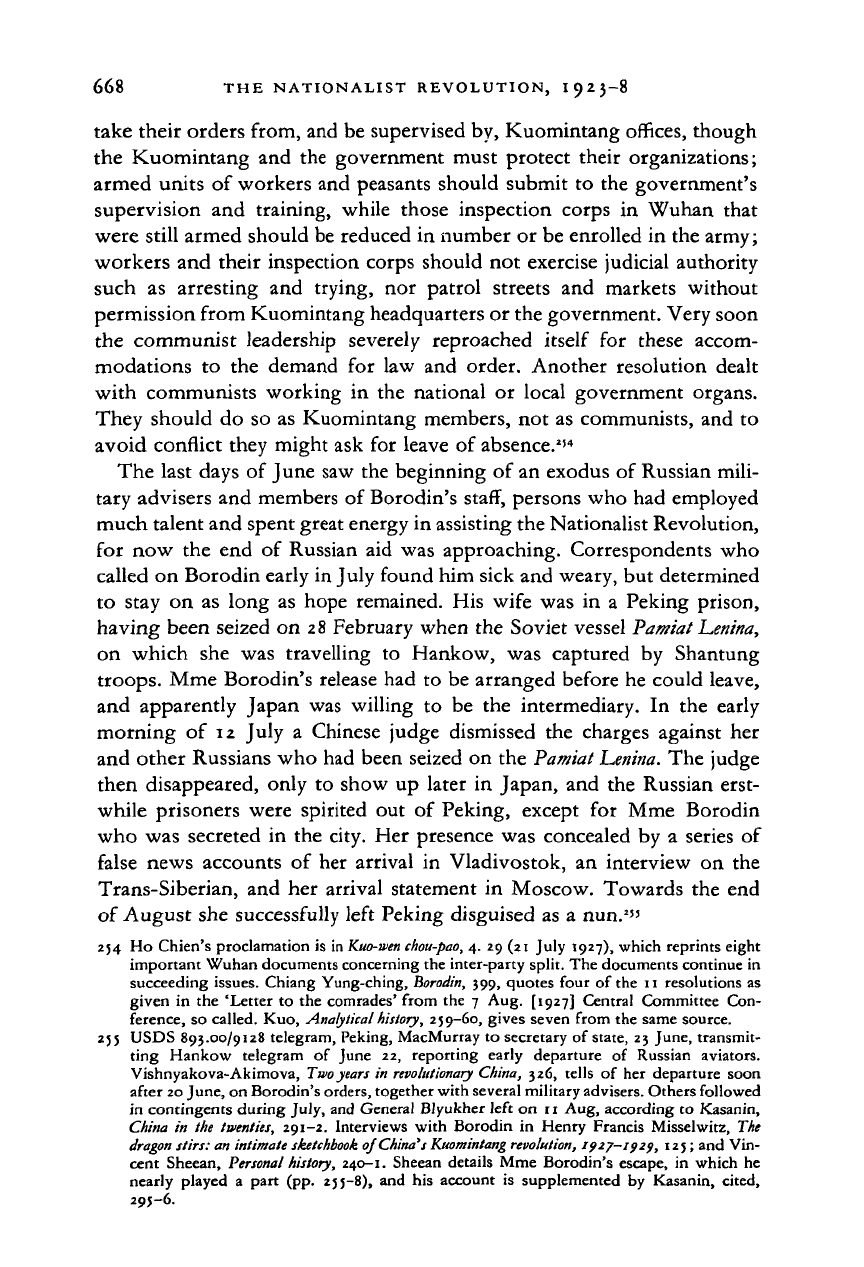
668 THE NATIONALIST REVOLUTION, 1923-8
take their orders from, and
be
supervised by, Kuomintang offices, though
the Kuomintang
and the
government must protect their organizations;
armed units
of
workers
and
peasants should submit
to the
government's
supervision
and
training, while those inspection corps
in
Wuhan that
were still armed should be reduced
in
number
or be
enrolled
in
the army;
workers
and
their inspection corps should
not
exercise judicial authority
such
as
arresting
and
trying,
nor
patrol streets
and
markets without
permission from Kuomintang headquarters
or
the government. Very soon
the communist leadership severely reproached itself
for
these accom-
modations
to
the
demand
for
law and
order. Another resolution dealt
with communists working
in
the
national
or
local government organs.
They should
do so as
Kuomintang members,
not as
communists,
and
to
avoid conflict they might ask
for
leave
of
absence.
2
'
4
The last days
of
June saw
the
beginning
of
an exodus
of
Russian mili-
tary advisers
and
members
of
Borodin's
staff,
persons who
had
employed
much talent and spent great energy in assisting the Nationalist Revolution,
for
now the end
of
Russian
aid was
approaching. Correspondents
who
called
on
Borodin early in July found him sick and weary,
but
determined
to stay
on
as
long
as
hope remained.
His
wife
was
in a
Peking prison,
having been seized
on
28 February when
the
Soviet vessel
Vamiat
L.enina,
on which
she
was
travelling
to
Hankow,
was
captured
by
Shantung
troops. Mme Borodin's release
had to be
arranged before
he
could leave,
and apparently Japan
was
willing
to be
the
intermediary.
In
the
early
morning
of
12
July
a
Chinese judge dismissed
the
charges against
her
and other Russians who had been seized
on the
Pamiat
Lenina.
The judge
then disappeared, only
to
show
up
later
in
Japan,
and the
Russian erst-
while prisoners were spirited
out
of
Peking, except
for
Mme
Borodin
who
was
secreted
in
the
city.
Her
presence
was
concealed
by
a
series
of
false news accounts
of
her
arrival
in
Vladivostok,
an
interview
on
the
Trans-Siberian,
and her
arrival statement
in
Moscow. Towards
the end
of August
she
successfully left Peking disguised
as
a
nun.
2
"
254
Ho
Chien's proclamation
is in
Kuo-men
chou-pao,
4. 29
(21 July 1927), which reprints eight
important Wuhan documents concerning
the
inter-party split.
The
documents continue
in
succeeding issues. Chiang Yung-ching,
Borodin,
399, quotes four
of
the 11
resolutions
as
given
in
the
'Letter
to
the
comrades' from
the
7
Aug.
[1927] Central Committee
Con-
ference,
so
called.
Kuo,
Analytical
history,
259-60, gives seven from
the
same source.
255 USDS 893.00/9128 telegram, Peking, MacMurray
to
secretary
of
state,
23
June, transmit-
ting Hankow telegram
of
June
22,
reporting early departure
of
Russian aviators.
Vishnyakova-Akimova,
Two years
in
revolutionary
China,
326,
tells
of
her
departure soon
after 20 June,
on
Borodin's orders, together with several military advisers. Others followed
in contingents during July,
and
General Blyukher left
on 11
Aug, according
to
Kasanin,
China
in
the
twenties, 291-2. Interviews with Borodin
in
Henry Francis Misselwitz,
The
dragon
stirs: an intimate
sketchbook
of China's
Kuomintang
revolution,
I^2y—if2f,
125;
and Vin-
cent Sheean,
Personal
history,
240-1.
Sheean details Mme Borodin's escape,
in
which
he
nearly played
a
part
(pp.
255-8),
and his
account
is
supplemented
by
Kasanin, cited,
295-6.
Cambridge Histories Online © Cambridge University Press, 2008
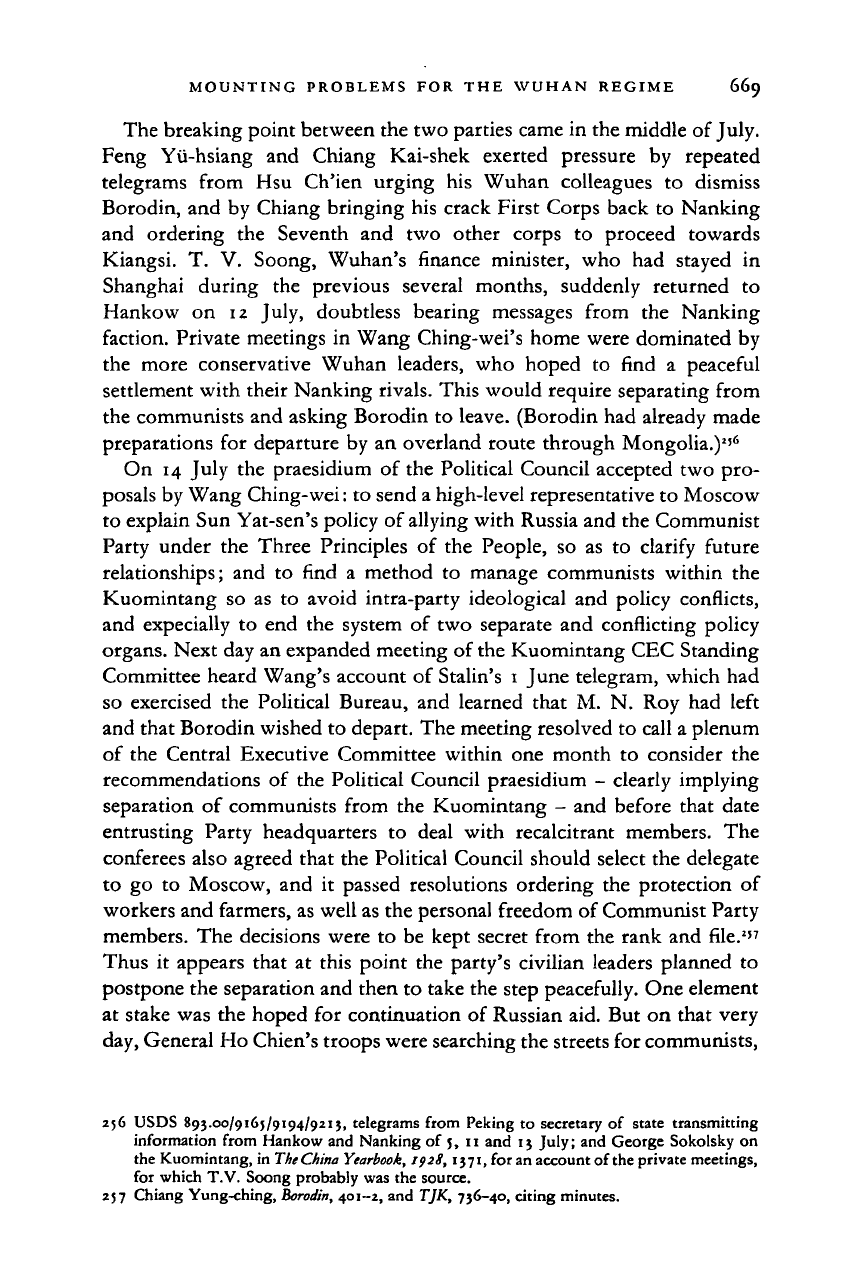
MOUNTING PROBLEMS FOR THE WUHAN REGIME 669
The breaking point between the two parties came in the middle of July.
Feng Yu-hsiang and Chiang Kai-shek exerted pressure by repeated
telegrams from Hsu Ch'ien urging his Wuhan colleagues to dismiss
Borodin, and by Chiang bringing his crack First Corps back to Nanking
and ordering the Seventh and two other corps to proceed towards
Kiangsi. T. V. Soong, Wuhan's finance minister, who had stayed in
Shanghai during the previous several months, suddenly returned to
Hankow on 12 July, doubtless bearing messages from the Nanking
faction. Private meetings in Wang Ching-wei's home were dominated by
the more conservative Wuhan leaders, who hoped to find a peaceful
settlement with their Nanking rivals. This would require separating from
the communists and asking Borodin to leave. (Borodin had already made
preparations for departure by an overland route through Mongolia.)
2
'
6
On 14 July the praesidium of the Political Council accepted two pro-
posals by Wang Ching-wei: to send a high-level representative to Moscow
to explain Sun Yat-sen's policy of allying with Russia and the Communist
Party under the Three Principles of the People, so as to clarify future
relationships; and to find a method to manage communists within the
Kuomintang so as to avoid intra-party ideological and policy conflicts,
and expecially to end the system of two separate and conflicting policy
organs. Next day an expanded meeting of the Kuomintang CEC Standing
Committee heard Wang's account of Stalin's 1 June telegram, which had
so exercised the Political Bureau, and learned that M. N. Roy had left
and that Borodin wished to depart. The meeting resolved to call a plenum
of the Central Executive Committee within one month to consider the
recommendations of the Political Council praesidium - clearly implying
separation of communists from the Kuomintang - and before that date
entrusting Party headquarters to deal with recalcitrant members. The
conferees also agreed that the Political Council should select the delegate
to go to Moscow, and it passed resolutions ordering the protection of
workers and farmers, as well as the personal freedom of Communist Party
members. The decisions were to be kept secret from the rank and file.
2
'
7
Thus it appears that at this point the party's civilian leaders planned to
postpone the separation and then to take the step peacefully. One element
at stake was the hoped for continuation of Russian aid. But on that very
day, General Ho Chien's troops were searching the streets for communists,
256 USDS 893.00/9165/9194/9213, telegrams from Peking to secretary of state transmitting
information from Hankow and Nanking of 5, 11 and 13 July; and George Sokolsky on
the Kuomintang, in
The China
Yearbook,
1928, I37i,foran account of the private meetings,
for which T.V. Soong probably was the source.
257 Chiang Yung-ching,
Borodin,
401-2, and TJK, 736-40, citing minutes.
Cambridge Histories Online © Cambridge University Press, 2008
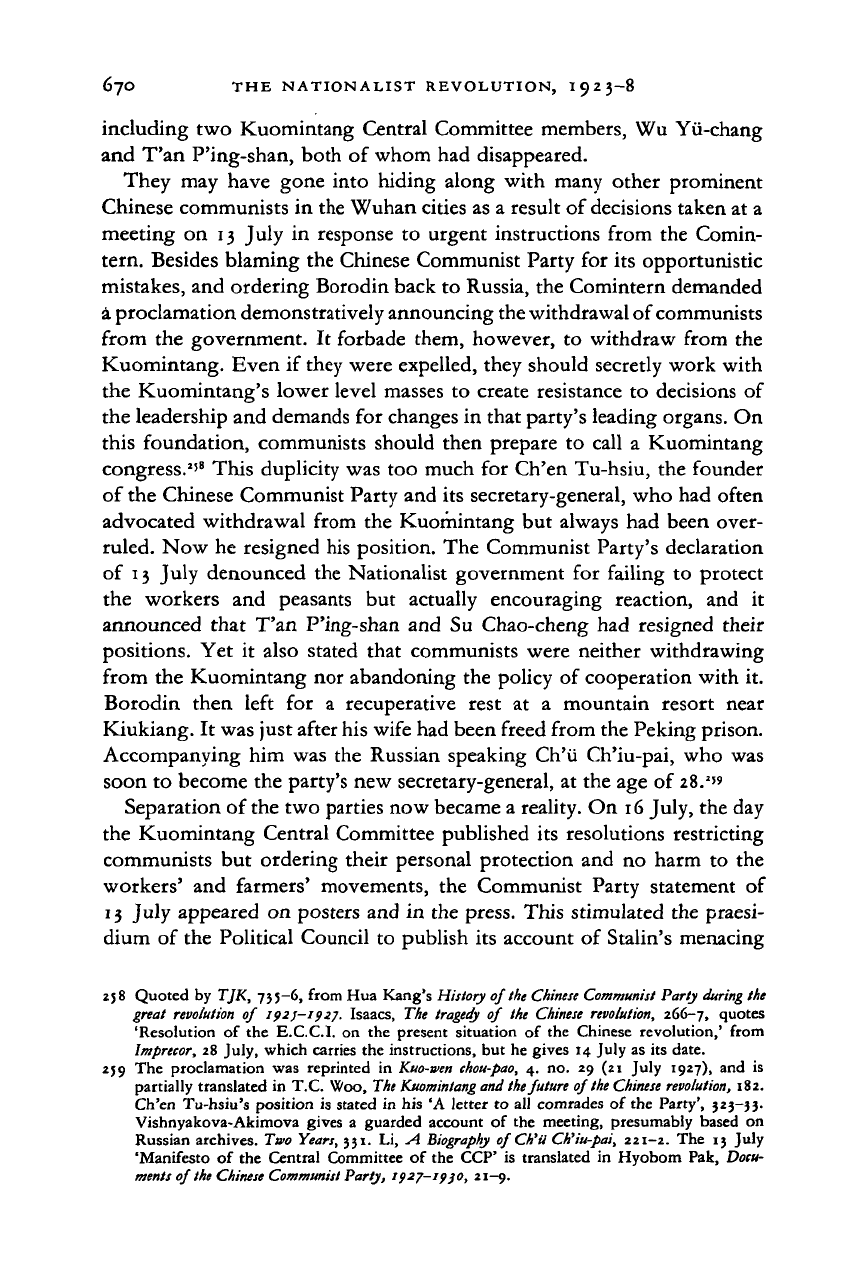
67O THE NATIONALIST REVOLUTION, I923-8
including two Kuomintang Central Committee members, Wu Yii-chang
and T'an P'ing-shan, both of whom had disappeared.
They may have gone into hiding along with many other prominent
Chinese communists in the Wuhan cities as a result of decisions taken at a
meeting on 13 July in response to urgent instructions from the Comin-
tern. Besides blaming the Chinese Communist Party for its opportunistic
mistakes, and ordering Borodin back to Russia, the Comintern demanded
a proclamation demonstratively announcing the withdrawal of communists
from the government. It forbade them, however, to withdraw from the
Kuomintang. Even if they were expelled, they should secretly work with
the Kuomintang's lower level masses to create resistance to decisions of
the leadership and demands for changes in that party's leading organs. On
this foundation, communists should then prepare to call a Kuomintang
congress.
2
'
8
This duplicity was too much for Ch'en Tu-hsiu, the founder
of the Chinese Communist Party and its secretary-general, who had often
advocated withdrawal from the Kuomintang but always had been over-
ruled. Now he resigned his position. The Communist Party's declaration
of 13 July denounced the Nationalist government for failing to protect
the workers and peasants but actually encouraging reaction, and it
announced that T'an P'ing-shan and Su Chao-cheng had resigned their
positions. Yet it also stated that communists were neither withdrawing
from the Kuomintang nor abandoning the policy of cooperation with it.
Borodin then left for a recuperative rest at a mountain resort near
Kiukiang. It was just after his wife had been freed from the Peking prison.
Accompanying him was the Russian speaking Ch'ii Ch'iu-pai, who was
soon to become the party's new secretary-general, at the age of 28.
2
«
Separation of the two parties now became a reality. On 16 July, the day
the Kuomintang Central Committee published its resolutions restricting
communists but ordering their personal protection and no harm to the
workers' and farmers' movements, the Communist Party statement of
13 July appeared on posters and in the press. This stimulated the praesi-
dium of the Political Council to publish its account of Stalin's menacing
258 Quoted by TJK, 735-6, from Hua Kang's History ofthe
Chinese Communist
Party
during
the
great
revolution
of i?2j-iyi/. Isaacs, The tragedy of the
Chinese
revolution,
266-7, quotes
'Resolution of the E.C.C.I. on the present situation of the Chinese revolution,' from
Imprecor, 28 July, which carries the instructions, but he gives 14 July as its date.
259 The proclamation was reprinted in
Kuo-wen
chou-pao,
4. no. 29 (21 July 1927), and is
partially translated in T.C. Woo,
The Kuomintang
and the future of
the Chinese
revolution,
182.
Ch'en Tu-hsiu's position is stated in his 'A letter to all comrades of the Party', 323-33.
Vishnyakova-Akimova gives a guarded account of the meeting, presumably based on
Russian archives. Two Years, 331. Li, A
Jiiography
of Ch'ii Ch'iu-pai, 221-2. The 13 July
'Manifesto of the Central Committee of the CCP' is translated in Hyobom Pak, Docu-
ments
of
the Chinese Communist
Party, 1927-19)0, 21-9.
Cambridge Histories Online © Cambridge University Press, 2008
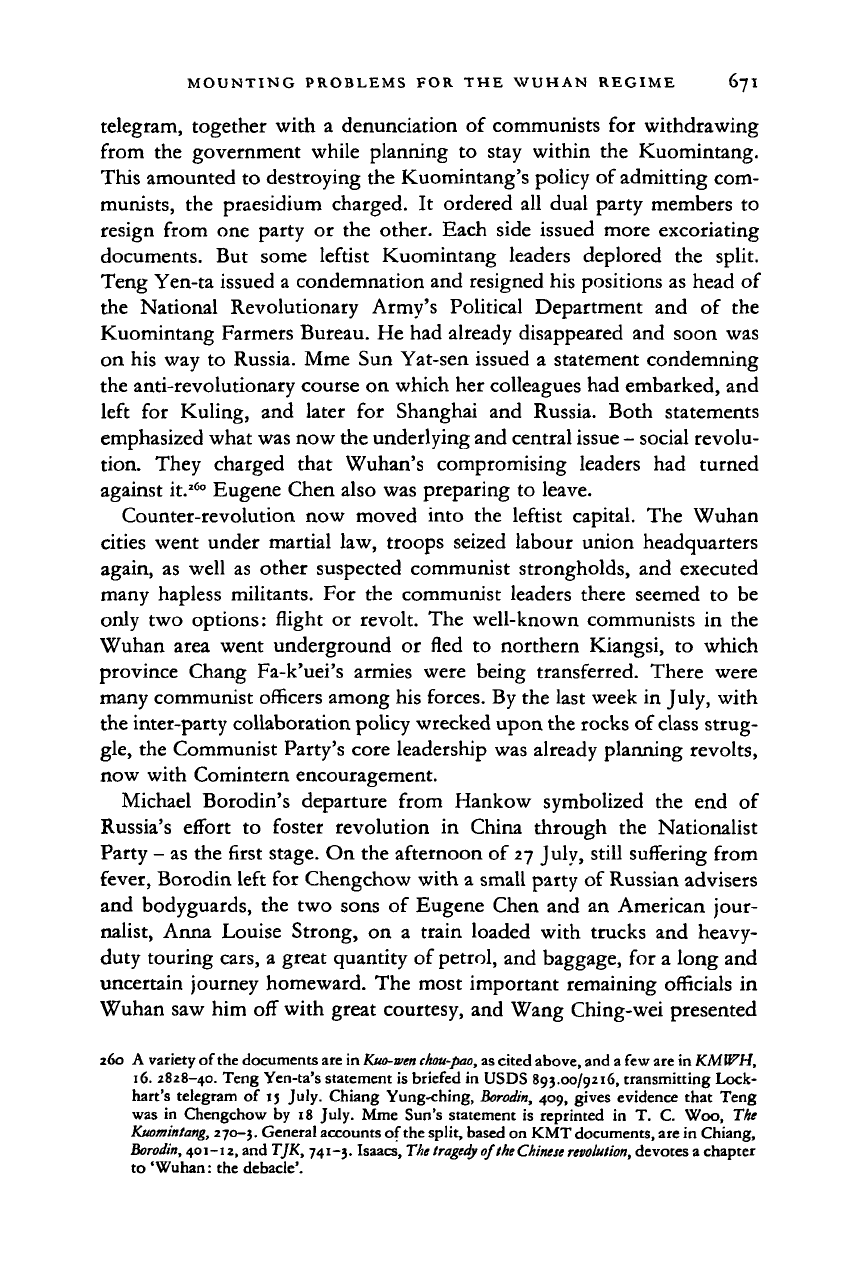
MOUNTING PROBLEMS FOR THE WUHAN REGIME 67I
telegram, together with a denunciation of communists for withdrawing
from the government while planning to stay within the Kuomintang.
This amounted to destroying the Kuomintang's policy of admitting com-
munists, the praesidium charged. It ordered all dual party members to
resign from one party or the other. Each side issued more excoriating
documents. But some leftist Kuomintang leaders deplored the split.
Teng Yen-ta issued a condemnation and resigned his positions as head of
the National Revolutionary Army's Political Department and of the
Kuomintang Farmers Bureau. He had already disappeared and soon was
on his way to Russia. Mme Sun Yat-sen issued a statement condemning
the anti-revolutionary course on which her colleagues had embarked, and
left for Kuling, and later for Shanghai and Russia. Both statements
emphasized what was now the underlying and central issue - social revolu-
tion. They charged that Wuhan's compromising leaders had turned
against it.
26
" Eugene Chen also was preparing to leave.
Counter-revolution now moved into the leftist capital. The Wuhan
cities went under martial law, troops seized labour union headquarters
again, as well as other suspected communist strongholds, and executed
many hapless militants. For the communist leaders there seemed to be
only two options: flight or revolt. The well-known communists in the
Wuhan area went underground or fled to northern Kiangsi, to which
province Chang Fa-k'uei's armies were being transferred. There were
many communist officers among his forces. By the last week in July, with
the inter-party collaboration policy wrecked upon the rocks of class strug-
gle,
the Communist Party's core leadership was already planning revolts,
now with Comintern encouragement.
Michael Borodin's departure from Hankow symbolized the end of
Russia's effort to foster revolution in China through the Nationalist
Party - as the first stage. On the afternoon of 27 July, still suffering from
fever, Borodin left for Chengchow with a small party of Russian advisers
and bodyguards, the two sons of Eugene Chen and an American jour-
nalist, Anna Louise Strong, on a train loaded with trucks and heavy-
duty touring cars, a great quantity of petrol, and baggage, for a long and
uncertain journey homeward. The most important remaining officials in
Wuhan saw him off with great courtesy, and Wang Ching-wei presented
260 A variety of the documents ate in
Kuo-wen
chou-pao,
as cited above, and a few are in
KMWH,
16.
2828-40. Teng Ven-ta's statement is briefed in USDS 893.00/9216, transmitting Lock-
hart's telegram of 15 July. Chiang Yung-ching,
Borodin,
409, gives evidence that Teng
was in Chengchow by 18 July. Mme Sun's statement is reprinted in T. C. Woo, The
Kuomintang,
270-3. General accounts of the split, based on KMT documents, are in Chiang,
Borodin,
401
-12,
and TJK, 741-3. Isaacs,
The tragedy
of
the Chinese
revolution,
devotes a chapter
to 'Wuhan: the debacle'.
Cambridge Histories Online © Cambridge University Press, 2008
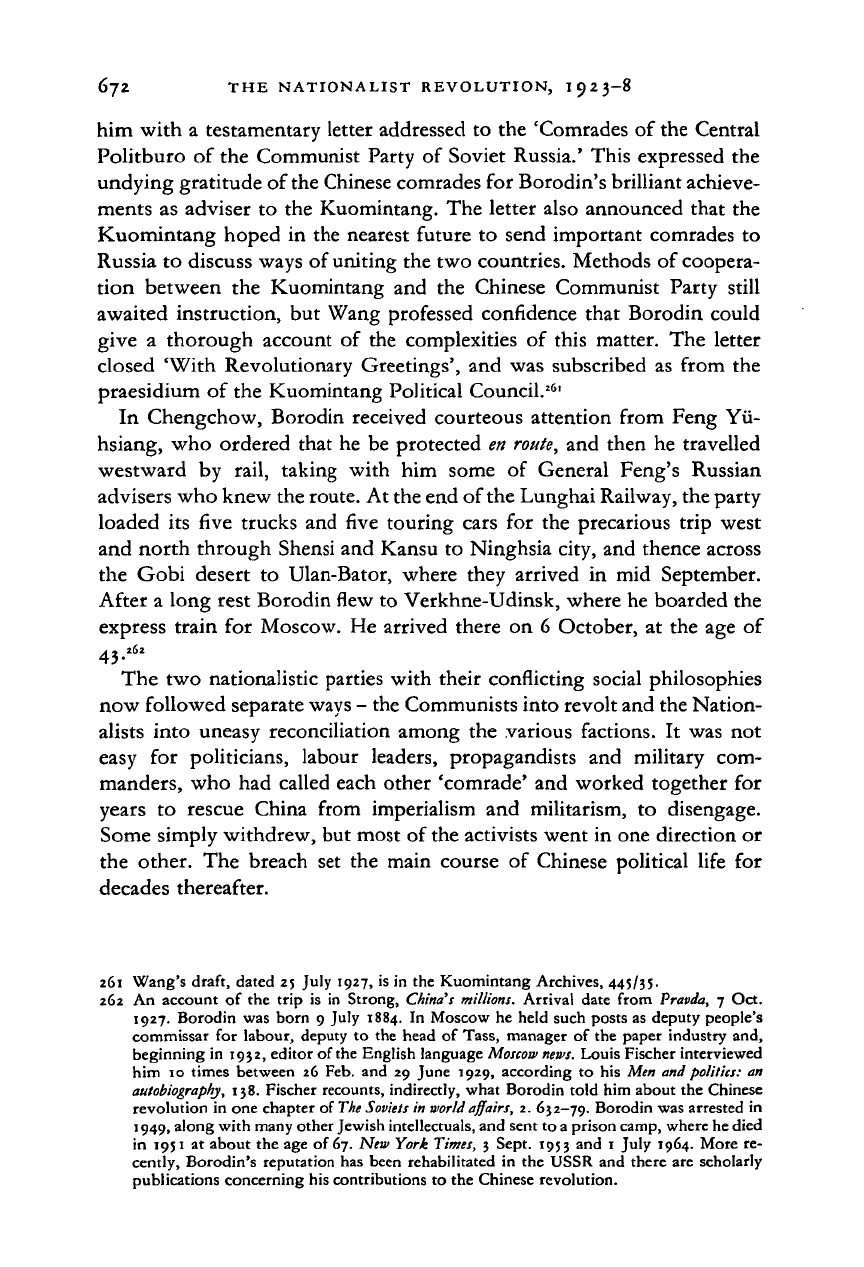
672 THE NATIONALIST REVOLUTION, I 9
2
3-8
him with
a
testamentary letter addressed
to
the
'Comrades
of
the Central
Politburo
of
the
Communist Party
of
Soviet Russia.' This expressed
the
undying gratitude
of
the Chinese comrades
for
Borodin's brilliant achieve-
ments
as
adviser
to
the
Kuomintang.
The
letter also announced that
the
Kuomintang hoped
in the
nearest future
to
send important comrades
to
Russia
to
discuss ways
of
uniting
the two
countries. Methods
of
coopera-
tion between
the
Kuomintang
and
the
Chinese Communist Party still
awaited instruction,
but
Wang professed confidence that Borodin could
give
a
thorough account
of
the
complexities
of
this matter.
The
letter
closed 'With Revolutionary Greetings',
and was
subscribed
as
from
the
praesidium
of
the
Kuomintang Political Council.
26
'
In Chengchow, Borodin received courteous attention from Feng
Yii-
hsiang,
who
ordered that
he be
protected en
route,
and
then
he
travelled
westward
by
rail, taking with
him
some
of
General Feng's Russian
advisers
who
knew
the
route.
At
the
end of
the Lunghai Railway, the party
loaded
its
five trucks
and
five touring cars
for
the
precarious trip west
and north through Shensi
and
Kansu
to
Ninghsia city,
and
thence across
the Gobi desert
to
Ulan-Bator, where they arrived
in
mid
September.
After
a
long rest Borodin flew
to
Verkhne-Udinsk, where
he
boarded
the
express train
for
Moscow.
He
arrived there
on
6
October,
at
the age of
The
two
nationalistic parties with their conflicting social philosophies
now followed separate ways
-
the
Communists into revolt and the Nation-
alists into uneasy reconciliation among
the
various factions.
It
was not
easy
for
politicians, labour leaders, propagandists
and
military
com-
manders,
who had
called each other 'comrade'
and
worked together
for
years
to
rescue China from imperialism
and
militarism,
to
disengage.
Some simply withdrew,
but
most
of
the activists went
in one
direction
or
the other.
The
breach
set
the
main course
of
Chinese political life
for
decades thereafter.
261 Wang's draft, dated 25 July 1927, is
in the
Kuomintang Archives, 445/35.
262
An
account
of
the trip
is in
Strong, China's
millions.
Arrival date from Pravda,
7 Oct.
1927.
Borodin was born
9
July 1884.
In
Moscow
he
held such posts as deputy people's
commissar
for
labour, deputy
to the
head
of
Tass, manager
of
the paper industry and,
beginning
in
1952, editor of the English language
Moscow
news.
Louis Fischer interviewed
him
10
times between
26
Feb.
and 29
June 1929, according
to his
Men and
politics:
an
autobiography,
i}8. Fischer recounts, indirectly, what Borodin told him about the Chinese
revolution
in
one chapter
of
The
Soviets
in
world
affairs,
2. 652—79. Borodin was arrested
in
1949,
along with many other Jewish intellectuals, and sent to a prison camp, where he died
in 1951
at
about the age
of
67.
New York Times,
3
Sept. 1953
an
^ '
July 1964. More
re-
cently, Borodin's reputation has been rehabilitated
in the
USSR
and
there are scholarly
publications concerning his contributions
to
the Chinese revolution.
Cambridge Histories Online © Cambridge University Press, 2008
